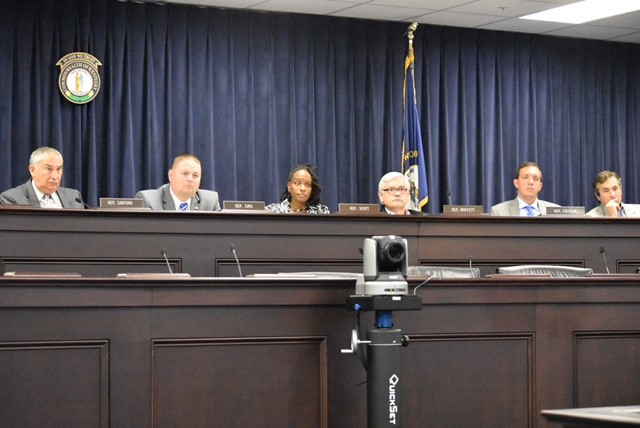Lawmakers Told There's No Easy Answer to Road Funding
 Funding Kentucky’s transportation needs, in an age of fuel-efficient vehicles and increased construction costs, is no small feat. The House Working Group on Kentucky’s Transportation Infrastructure heard from two men Thursday who warned there are no easy answers. House Speaker Jeff Hoover (R-Jamestown) appointed the Working Group back in June to look for ways to meet the state’s transportation needs. Thursday morning members heard from the former Secretary of Pennsylvania’s Department of Transportation and from a senior policy specialist at the National Conference of State Legislatures. Both men told lawmakers states are taking the lead in securing transportation funds and becoming more focused on ways to tax transportation usage.
Funding Kentucky’s transportation needs, in an age of fuel-efficient vehicles and increased construction costs, is no small feat. The House Working Group on Kentucky’s Transportation Infrastructure heard from two men Thursday who warned there are no easy answers. House Speaker Jeff Hoover (R-Jamestown) appointed the Working Group back in June to look for ways to meet the state’s transportation needs. Thursday morning members heard from the former Secretary of Pennsylvania’s Department of Transportation and from a senior policy specialist at the National Conference of State Legislatures. Both men told lawmakers states are taking the lead in securing transportation funds and becoming more focused on ways to tax transportation usage.
Barry Schoch was the Transportation Director for Pennsylvania from 2011 to 2015. During his tenure, the state passed a transportation funding bill, known as Act 89. Schoch told Kentucky lawmakers Thursday morning that his state tried several failed ideas to address transportation funding before succeeding with Act 89. He said the bill took a dual approach, finding new revenue sources and reforming the transportation department to make it more efficient. Schoch warned lawmakers infrastructure is an ongoing cost that needs an ongoing funding source. “Any type of infrastructure requires continual investment over time. If you don’t do the maintenance, costs go higher.”
Before Act 89, Pennsylvania was seeing its state road funds decline due to rising fuel efficiency in vehicles. The state’s largest single source of revenue was the gas tax. National Conference of State Legislatures Senior Policy Specialist Kevin Pula testified many states are dealing with the impact of increased fuel efficiency. Pula referenced a Pew Charitable Trusts analysis of highway data that showed fuel taxes make up 66 percent of federal road funds and 31 percent of most state funds. The problem is gas tax revenues are dropping, down from 2.3 percent nationwide in 1993 to 1.6 percent in 2011. While revenue is declining, transportation construction costs are skyrocketing, up 62 percent since 1990. Pula reminded lawmakers the math equation could only get worse as new federal fuel efficiency guidelines are still set to go into effect in 2025.
Pennsylvania increased its vehicle and driver fees, uncapped its oil company franchise tax, increased license fees and fines and passed several other reforms, including developing public/private partnerships for hundreds of bridge replacements. The money raised was directly put into a 10-year road improvement plan that included money for local roads and bridges. Representative Sal Santoro (R-Florence) questioned if Pennsylvania focused on miles driven when allocating local road funds. “We actually revised this in our transportation bill, to make it more equitable,” Schoch testified. “The counties all get money for maintenance of the state roads in that county. We changed the law to make a bigger percentage of that based on mileage and traffic so there was a fairer distribution of the money around the state.”
The Kentucky League of Cities is advocating for a similar revision in Kentucky to make road funds more equitable. Representative Jerry Miller (R-Louisville) proposed House Bill 292 in the 2017 Regular Session of the General Assembly. It would have divided revenue above $825 million, the total available for revenue sharing in Kentucky in FY 2014, between incorporated and unincorporated areas, based on population and road mileage. The current road funding formula was designed in 1948, when one-third of Kentucky’s population was urban. Today, two-thirds of the state is considered urban. Pula told lawmakers other states are also looking at revising road funding formulas to provide more equitable allocations to booming urban areas.
Both men also testified that state leaders are starting to look at how to collect a fair usage payment from drivers with electric and hybrid vehicles. Those types of vehicles use much less to no gasoline and therefore pay little to no gas tax. Pula said 17 states have now imposed electric vehicle fees, ranging from $50 to $200.


